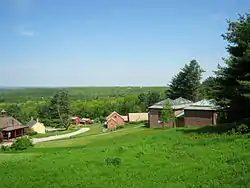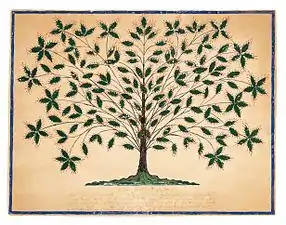Fruitlands Museum
Fruitlands Museum in Harvard, Massachusetts, is a museum about multiple visions of America on the site of the short-lived utopian community, Fruitlands. The museum includes the Fruitlands farmhouse (a National Historic Landmark), a museum about Shaker life, an art gallery with 19th-century landscape paintings, vernacular American portraits, and other changing exhibitions, and a museum of Native American history.
Fruitlands Museum Historic District | |
 Fruitlands Museum | |
  | |
| Location | Harvard, Massachusetts |
|---|---|
| Coordinates | 42°29′37″N 71°36′47″W |
| Area | 210 acres (85 ha) |
| Built | 1910 |
| Architectural style | Shingle Style, Bungalow/Craftsman |
| NRHP reference No. | 97000439[1] |
| Added to NRHP | May 23, 1997 |
 |
| Topics |
|---|
|
| Notable people |
|
Founders
Other members
|
Visitors can tour the farmhouse, which has been restored to appear as it did during the 1840s, and exhibits about Transcendentalism and the Alcott family. Fruitlands offers a diverse schedule of contemporary exhibits, lectures, outdoor concerts and easy walking trails. There is also a museum store and restaurant. The properties are overseen by The Trustees of Reservations.
History
Fruitlands, inspired by Transcendentalism and Amos Bronson Alcott's ideas of societal reform, was established on 90 acres (360,000 m2) purchased by Charles Lane in May 1843.[2] People interested in joining the community began moving in the next month and the site was optimistically named "Fruitlands" despite having only a small cluster of apple trees. The community was based on self-sufficiency, using no hired labor and growing all the food they needed themselves.[3] The community ultimately failed because of the difficulty in growing crops. Community members began moving away as early as October 1843; Lane and Alcott abandoned it in January 1844.[4]
The property was purchased in 1910 by Clara Endicott Sears, who opened the farmhouse to the public in 1914 as a museum.[5] In addition to the Fruitlands building, the site now includes a transplanted Shaker house from the nearby Harvard Shaker Village, Native American artifacts and Hudson River School paintings.[6] The museum is primarily the result of the efforts of Sears, a preservationist.[7]
Since 2015, the Fruitlands Museum has held an amateur cyclocross race on its grounds. Notorious for the rough surface of the course as well as the often muddy off-cambers utilized, it has quickly become a favorite amongst the New England cyclocross community.[8] The elite men's race winners have been Curtis White and Jeremy Durrin (in 2015 and 2016, respectively) while the elite women's race winners have been Rebecca Wellons and Kathleen Wanat.[9][10]
References
- "National Register Information System". National Register of Historic Places. National Park Service. April 15, 2008.
- Packer 2007, p. 148.
- Hankins 2004, p. 36.
- Packer 2007, p. 149.
- Felton 2006, p. 133.
- Massachusetts Office of Travel and tourism - Find Lodging - Fruitlands Museum, retrieved 1 October 2008
- National Park Service - Fruitlands Museum Historic District, retrieved 1 October 2008
- "Cyclocross Race". Fruitlands Museum. Retrieved 31 December 2016.
- "Fruitlands Cup of CX 2015 Results". CrossResults. Retrieved 31 December 2016.
- "Fruitlands' Cup of Cyclocross 2016 Results". CrossResults. Retrieved 31 December 2016.
Sources
- Felton, R (2006). A journey into the Transcendentalists' New England. Berkeley, Calif: Roaring Forties Press. ISBN 978-0982341018. OCLC 462997233.
- Hankins, Barry (2004). The Second Great Awakening and the Transcendentalists. Westport, Conn: Greenwood Press. ISBN 978-0313318481. OCLC 53986866.
- Packer, Barbara (2007). The transcendentalists. Athens: University of Georgia Press. ISBN 978-0820329581. OCLC 76871414.
